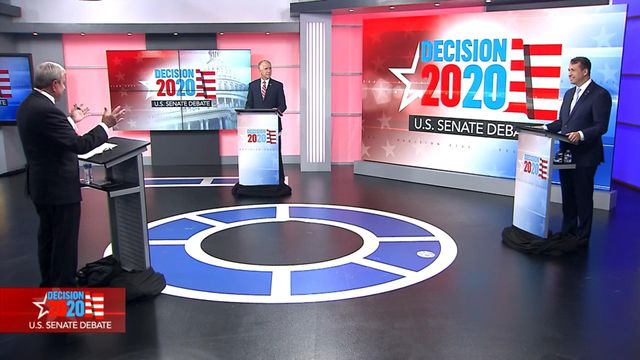Fact check: Cunningham says Tillis blocked 'his own party's efforts to reduce' drug prices
Democratic U.S. Senate candidate Cal Cunningham says his opponent, incumbent Republican Thom Tillis, is an example of why people shouldn't trust a vaccine approved by the government. Cunningham said Tillis has taken money from pharmaceutical companies and has blocked "his own party's efforts to reduce the cost of prescription drugs."
Posted — UpdatedIf a coronavirus vaccine is approved by the end of the year, Cal Cunningham says he would have valid reasons for questioning its safety.
For one, government officials have offered mixed messaging on when a vaccine might be ready. (President Trump has suggested November, while others have said that’s unlikely.)
Then, there’s the influence of big healthcare companies on Washington politicians.
In Monday’s U.S. Senate debate on WRAL, Cunningham accused incumbent Republican Thom Tillis of being a friend of “big pharma.” And he pointed to Tillis’ record on pharmaceuticals as an example of “corruption in Washington.”
“We can almost look no further than Senator Tillis taking over $400,000 from big pharma, and then even blocking his own party’s efforts to reduce the cost of prescription drugs,” Cunningham said.
Is it true that Tillis has blocked “his own party’s efforts to reduce the cost of prescription drugs?”
Tillis has opposed some bills that aimed to reduce prescription drug prices. (In some cases, he has offered alternatives) However, it’s a stretch to suggest Tillis is responsible for stopping those bills from succeeding.
The ‘most viable’ bill
The Cunningham campaign pointed to a pair of bills sponsored by Republicans, the most significant of which is the Prescription Drug Pricing Reduction Act of 2019. The bill was introduced by U.S. Sens. Chuck Grassley, an Iowa Republican, and Ron Wyden, a Democrat from Oregon.
It’s probably the “most comprehensive (drug pricing) package” of the last few years, said Juliette Cubanski, deputy director of the Kaiser Family Foundation’s Program on Medicare Policy.
The bill aimed to put an inflation-based cap on some drug prices or require rebates from drug makers.
“It was interesting to see (price caps) included in Grassley’s legislation, considering the Republican belief” in the free market, she told PolitiFact in a phone interview.
Bill stalled
Asked about Grassley’s bill this week, campaign spokesman Andrew Romeo said Tillis supports his alternative bill, but “has had several conversations with Senator Grassley about how to find common ground while striking the balance of lowering drug prices and protecting innovation.”
Other bills
The Cunningham campaign also cited the Creating and Restoring Equal Access to Equivalent Samples Act of 2018, known as the CREATES Act. Initial Republican co-sponsors included Grassley, as well as Tom Cotton of Arkansas, Mike Lee of Utah and Susan Collins of Maine.
The legislation aimed to end “shenanigans” that delay competition from generic and biosimilar drugs, according to the American Journal of Managed Care. Tillis initially opposed the CREATES Act, but his office says he supported it after it was amended and included in an appropriations bill.
Our ruling
Cunningham says Tillis has a record of “blocking his own party’s efforts to reduce the cost of prescription drugs.”
It’s fair to say that, in a few instances, Tillis has opposed his own party’s efforts to reduce the cost of prescription drugs. That includes Grassley’s bill, which experts see as a significant effort.
But Tillis has also offered alternatives. And there’s not a lot of definitive proof that Tillis, alone, has halted legislation that would have otherwise passed.
Cunningham’s statement is partially accurate but leaves out important details or takes things out of context. We rate it Half True.
Related Topics
• Credits
Copyright 2024 by Capitol Broadcasting Company. All rights reserved. This material may not be published, broadcast, rewritten or redistributed.





